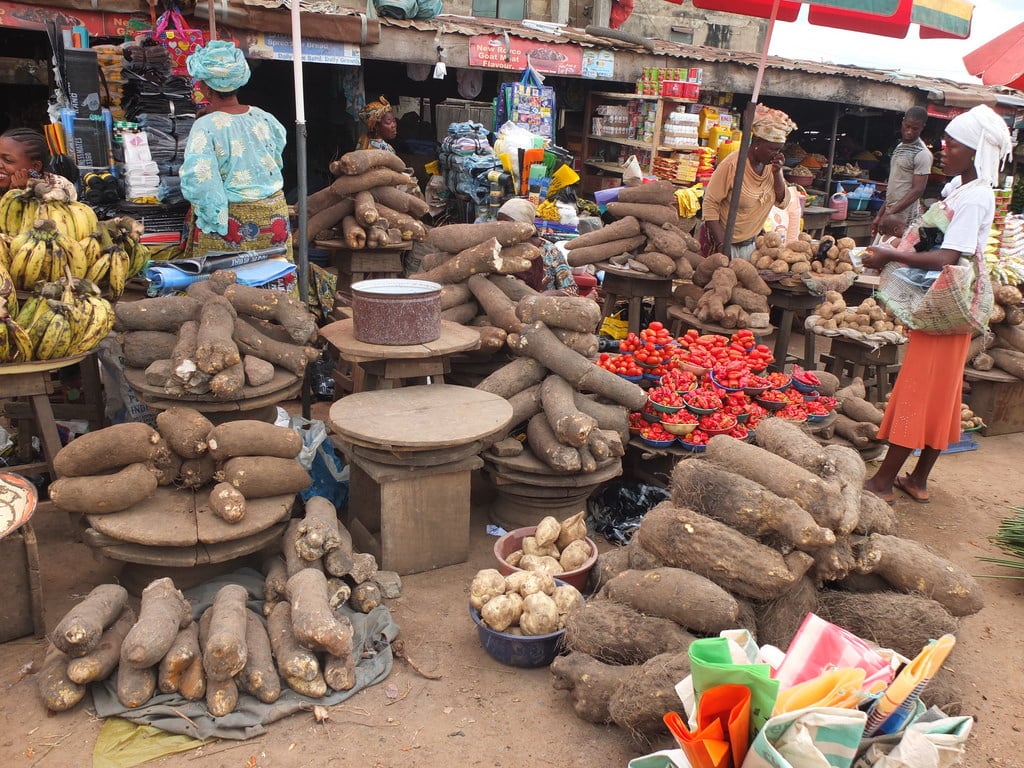Nigeria’s inflation rate climbed to 34.6% in November 2024, marking an increase from 33.8% in October, according to the latest Consumer Price Index (CPI) report by the National Bureau of Statistics (NBS). This represents a year-on-year jump of 6.4 percentage points compared to the 28.2% recorded in November 2023.
On a month-on-month basis, inflation rose by 2.638% in November 2024, showing a marginal slowdown from October’s 2.64% growth. While prices continue to rise, the slight dip in monthly growth indicates a marginal easing in the pace of price increases.
Food inflation, a critical driver of overall inflation, surged to 39.93% in November, a significant rise from 32.84% in November 2023. Staple items such as yams, maize, rice, cocoyams, and vegetable oil were among the top contributors to the soaring prices. On a month-on-month basis, food inflation increased by 2.98%, slightly higher than October’s 2.94%. Items like dried fish, yam flour, millet, powdered milk, and frozen meat drove this monthly increase.
Over the past year, the average food inflation rate rose to 38.67%, an increase of 11.58 percentage points compared to the 27.09% recorded in November 2023. This highlights the persistent pressure on consumers and households, with many struggling to afford basic necessities.
Food inflation varied across states, with Bauchi recording the highest rate at 46.21%, followed by Kebbi (42.41%) and Anambra (40.48%). Delta (26.47%), Benue (28.98%), and Katsina (29.57%) reported the lowest year-on-year food inflation rates. On a month-on-month basis, states like Yobe (5.14%), Kebbi (5.10%), and Anambra (4.88%) led the pack, while Adamawa (0.95%), Osun (1.12%), and Kogi (1.29%) saw the slowest increases.
Key contributors to rising food prices include tubers like yams and cocoyams, cereals such as maize and rice, and dairy products like powdered milk. Other significant drivers were fish varieties, including dried catfish, and meats such as dried beef and frozen chicken. The NBS attributed the sustained rise in food prices to supply chain disruptions and increased demand for key staples.
The relentless rise in inflation underscores the urgent need for policy interventions to stabilize food supply chains and curb rising prices. Addressing these challenges will require coordinated efforts to boost agricultural productivity, improve distribution networks, and tackle inefficiencies in the food production sector. Without decisive action, the burden on households is likely to intensify further.












I think the government should just start a barter system for food to combat inflation. Who needs money anyway?
Barter system for food wont solve inflation. Money is essential for a functioning economy.
I think the government should ban all imported food and only allow Nigerian products to lower inflation. Whos with me?
No, thats extreme. We need variety in our food choices for a balanced diet.
I think we should all start growing our own food in our backyard to beat these crazy inflation rates! Whos with me? 🌱🥕 #InflationSolutions
I think the government should just start a national garden project to grow our own food and tackle this inflation madness!
Its not the governments job to be our personal gardeners. Take responsibility for your own food.
Wow, maybe if Nigeria invested in more sustainable agriculture, we wouldnt be in this mess. Just a thought 🌾🤔
I think the government should introduce a food price freeze to control inflation. Lets see some bold moves!
I know inflation is bad news, but maybe we should all just switch to a diet of air and sunlight to save money on food. 😅
I think the government should ban imported food to boost local production and reduce inflation. Lets support Nigerian farmers!
Wow, maybe we should all start growing our own food like back in the old days. Whos up for a community garden project?
That sounds like a great idea! Count me in for the community garden project. Lets do it!
I think we should all start growing our own food to combat inflation. Whos with me? Lets get those green thumbs going!
Growing your own food is unrealistic for many. Support local farmers instead.
I think the government should just start a national garden project to combat rising food prices. Lets all become farmers!
I think we should all just start growing our own food in our backyards to avoid these crazy prices! Whos with me? 🌱🍅 #InflationWoes
Is it just me or does anyone else think we should start a national food gardening campaign to tackle these crazy inflation rates in Nigeria? 🌱🍅 #FoodForThought
I think we should all start growing our own food to combat inflation. Whos in for a community garden project?
I think we should all start growing our own food to combat inflation. Whos with me? Lets become backyard farmers!
I believe inflation is just a government conspiracy to distract us from the real issues. Wake up, sheeple! 🐑👀
Inflation is a complex economic phenomenon, not a conspiracy. Educate yourself before spreading misinformation.
Who even needs food when you can just breathe in that sweet, sweet inflation air? Inflation = ultimate diet plan, amirite? 😂🤷♂️
Um, thats a pretty risky diet plan to rely on. Maybe stick to healthy eating instead.
I think we should all start growing our own food to combat rising prices. Whos in for a backyard garden party? 🌱🍅#SustainableSolutions
Sorry, but not everyone has the time or space for a garden. Lets explore other options.
I think the government should legalize hunting wild animals to control food prices. Its natures way of balancing things out.
Balancing food prices by killing wild animals is not the solution. Respect wildlife and find sustainable alternatives.
I think the solution is to start a nationwide vegetable garden project to combat high food prices. Whos with me? 🌱🥕 #InflationDebate
I think we should all just start growing our own food in our backyard. Who needs supermarkets anyway? #DIYrevolution
I think we should all start a garden on our rooftops to combat rising food prices. Whos with me? 🌿🍅 #RoofGardenRevolution
Is it just me, or does anyone else think that maybe we should start investing in virtual farms to combat food inflation? 🤔🌾 #JustSayin
I think we should all start growing our own food to combat these crazy inflation rates. Whos with me? 🌱🍅 #FoodRevolution
I think we should all start growing our own food! Who needs supermarkets anyway? Lets embrace self-sustainability!
I dont get why people complain about rising food prices. Just plant your own veggies and problem solved! #DIYfarmers 🌽🥕
I think the government should just start a national food-sharing program. Lets all eat together and lower those crazy prices! 🍽️🇳🇬 #FoodUnity
I think we should all start planting our own food to combat inflation. Whos ready to become a backyard farmer? 🌱🌽 #FoodRevolution
I think we should all start growing our own food in our backyard to combat these crazy inflation rates! Whos with me? 🌱🍅
Who knew food prices could skyrocket so fast in Nigeria? Whats causing this inflation hike? Time to investigate!
Is this the beginning of a food crisis in Nigeria? The inflation rate is alarming. Something needs to be done fast!
Is this inflation rate sustainable? How can Nigerians cope with such high prices? Share your thoughts!
Wow, 34.6% inflation in Nigeria?! Insane! Do you think the government will take effective measures to curb this economic crisis?
Is the government doing enough to address the skyrocketing food prices in Nigeria? Its getting harder for the average person to put food on the table.
Do you think the government is doing enough to tackle the inflation crisis in Nigeria? Share your thoughts!
Is it time for Nigeria to consider implementing stricter price controls to combat the skyrocketing inflation rates? Lets discuss!